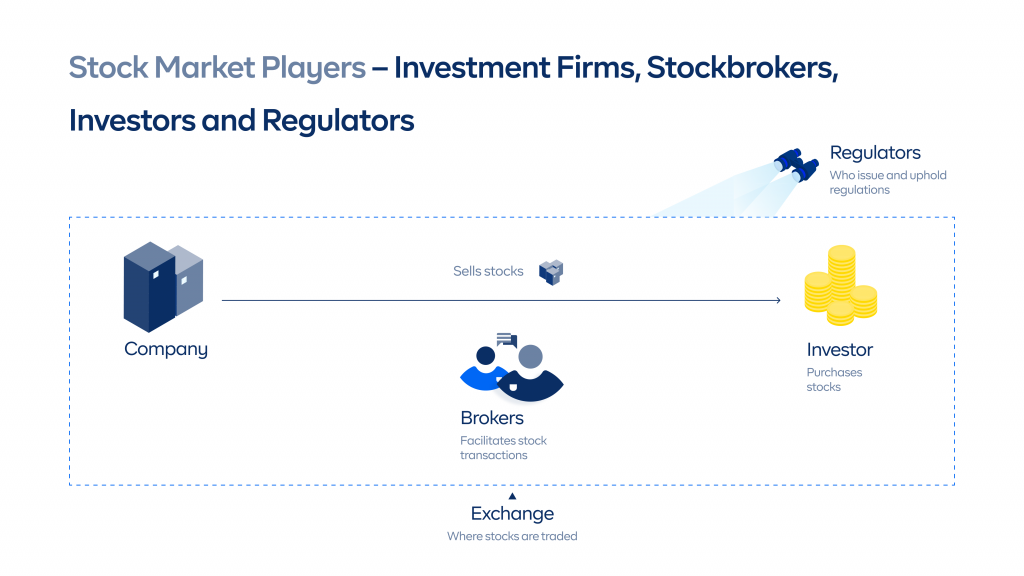
- What is the Stock Market?
- Brief History of the Stock Market
- How the Stock Market Works
- How Stock Markets are Regulated
- How to Invest in Stock Market in Nigeria
- Stock Market Players
- Bull and Bear Markets
- Alternate Trading Systems
- Frequently Asked Questions
What is the Stock Market?
The stock market is a marketplace where investors come together to buy and sell investments, mostly stocks.
Stocks (equities) represent a part of ownership in a company. Stock markets give companies access to public capital swiftly and well-functioning ones are essential for economic growth.
Brief History of the Stock Market
The Dutch East India Corporation, the first publicly listed company, founded the first modern stock trading in Amsterdam. The business decided to sell stocks and give shareholders dividends to get funds. The Amsterdam stock exchange was subsequently opened in 1611. Since then, companies have been collecting funds from willing investors to support all kinds of businesses, sectors, and industries.
How the Stock Market Works
When you buy a stock, you are purchasing one or more pieces (shares) of the company.
You can only buy shares of public companies, i.e. companies whose shares are available in a public market called the stock market.
You may have once heard a statement like—”the stock market went up this week”—this means overall, the prices of shares in public companies increased, and people paid more to buy them than they did last week.
Conversely, if you hear the stock market came down this week, investors generally paid less for companies than they did last week.
While the stock market usually experiences periods of decline and growth, it has historically performed well. However, past performance is not a guarantee of future results.
In addition, note that only stocks that are listed on an exchange are eligible for purchase or sale.
As a result, the stock market serves as a hub for stock buyers and sellers.
How Stock Markets are Regulated
Most countries have a stock market, each with its respective financial regulator.
The Securities and Exchange Commission (SEC Nigeria) oversees the Nigerian Exchange Group (formerly Nigeria Stock Exchange).
They are the primary regulator of the Nigerian capital market. They maintain fair and orderly deals in securities and guard the market against insider trading abuses.
The SEC works independently of the government and without political influence.
Companies listed on the Nigerian Exchange Group are regulated, and their dealings are monitored by the SEC.
Failure to adhere to regulations can lead to disciplinary measures.
How to Invest in Stock Market in Nigeria
Investing in the stock market or investing, in general, is essential if you want to increase your wealth and keep up with inflation in Nigeria.
Here’s how to invest in the stock market in Nigeria:
1. Select a licensed investment bank or stockbroker
Investors designate stockbrokers to execute their purchase or sell instructions.
A member of the Nigerian Exchange Group, a broker-dealer registered with the SEC, is referred to as a stockbroker.
Important variables to take into account when selecting a stockbroker include their position with the SEC, accessibility, price, and integrity.
2. Register with the broker
To register with a stockbroker, clients must fill out the registration form issued by the broker (either online or physically) and provide documents like proof of identification and address, amongst others.
3. Make a deposit
After funding your account, get your trading number, which will serve as your identifier on the Nigerian Exchange Group.
4. Continuous research
Continue learning about the market and trading as much as you can if you want to sharpen your trading abilities.
Investors must develop analytical skills for long-term success. Read books and familiarize yourself with resources linked to financial news to learn about Nigerian stocks and better comprehend the market.
This way you don’t make emotional investment decisions when market fluctuations happen.

Stock Market Players: Investment Firms, Stockbrokers, Investors and Regulators
The stock market involves a variety of people and organisations, and each one plays a specific role.
Stocks are sold by companies, purchased by investors, traded on exchanges, facilitated by brokers, and governed by regulators who issue and uphold regulations.
Stockbrokers
These are the key players involved in helping you make a stock purchase. Stocks are bought and sold by brokers on behalf of their customers.
A broker is someone you deal with frequently and contact when you need to make a trade.
A broker might also be a business with a website where you can log in and place your trades quickly and according to your specifications.
Brokers make earnings by charging transaction fees to their clients.
Investment banks
Investment banks provide financial services that serve as a middleman in significant and intricate transactions.
Before the securities are offered for sale, the investment bank reviews a company’s financial statements for correctness. Then, it disseminates a prospectus to investors that thoroughly outlines the offering.
Read more about investment banking.
Investors
The market participant that the general public most frequently associates with the stock market is the investor.
Investors are those who buy stock in a company to hold it for a long time because they think it will do well in the future.
In the market, there are many distinct types of investors and they own the majority of the money active in the markets.
Typically, investors are focused on two things: value and success.

Bull and Bear Markets
Bull and Bear markets derive their names from the way the animals fight and attack their opponents.
A bull will thrust its horns up while a bear will swoop down.
These movements can be attributed to market trends; If a trend is up, then it’s seen as a bull market, but if the trend is down, it’s considered a bear market.
Bull Market
Also known as ‘Bullish’, is a period in the stock market where most investors buy.
This is when demand outweighs supply; investors are more confident in the market because prices are rising.
Although Bull market is a term mostly used in the stock market, it can also be used to refer to anything that is traded, like bonds, currency, real estate and commodities.
The term is usually used when a huge portion of security prices rise for a long time.
Generally, in this period, the overall demand for stocks is buoyant.
Bear Market
Also known as ‘Bearish’. This is the opposite of a Bull market.
It is characterised by fallen prices and extended market declines.
It’s usually when securities fall at least 20% or more. This is when investors’ confidence gained during the bull market starts to decline.
The bear market can last for months to a couple of years and if it affects the economy enough, it can sometimes lead to a recession.
Bear market ends when prices get to a point where they can no longer drop, and they go on a steady upward climb which is the beginning of bull markets.
Bear markets can be challenging to trade, especially for amateur traders.
It can take time to predict when a bear market will end.
Alternate Trading Systems
An Alternative Trading System (ATS) is a system that electronically allows stocks to trade but is not registered as an exchange.
Examples of ATS are call markets, dark pools, crossing networks, and electronic communication networks.
ATS occasionally enables institutions to trade amongst themselves, matches sellers and buyers for transactions, and has less strict regulations than an exchange.
What are the types of stocks?
- Common stock
- Preferred stock
- Large-cap stocks
- Mid-cap stocks
- Small-cap stocks
- Domestic stocks
- International stocks
- Growth stocks
- Value stocks
- IPO stocks
- Dividend stocks
- Non-dividend stocks
- Blue chip stocks
- Penny stocks
Read more about the types of stocks.
Which stock is the best to buy now?
What you buy or do not buy depends on your knowledge of the company, your goals and risk tolerance. Do proper research to make informed decisions.
Does Nigeria have a stock market?
Yes, the Nigerian Exchange Group (formerly The Nigerian Stock Exchange).
Where to invest in 2023?
Take a look at these safe high-yield investments.
Which stocks are the best to invest in during a recession?
Dollar assets, Utility sector, Quality stocks, Gold and Bonds.
Learn more about What to Invest in During a Recession
Bottom Line
Before investing in the stock market, be sure to do your research and talk to a qualified financial planner if you can. Understanding the direction the market is taking, having a long-term plan, as well as a diversified portfolio, can help you manage the ups and downs of the market and succeed on your trading journey.

RELATED
What Are Stocks and How to Invest in Them
Who are Speculators in the Stock Market?
Initial Public Offering (IPO): What it means in Stock Market
